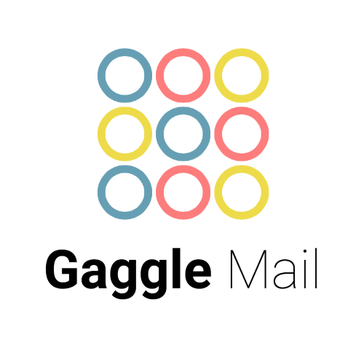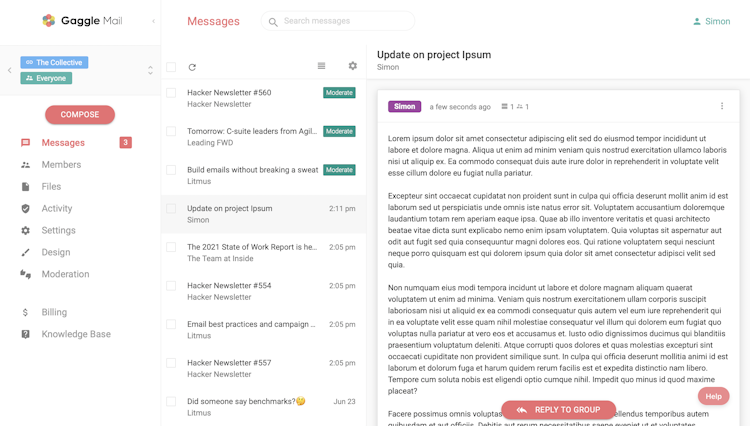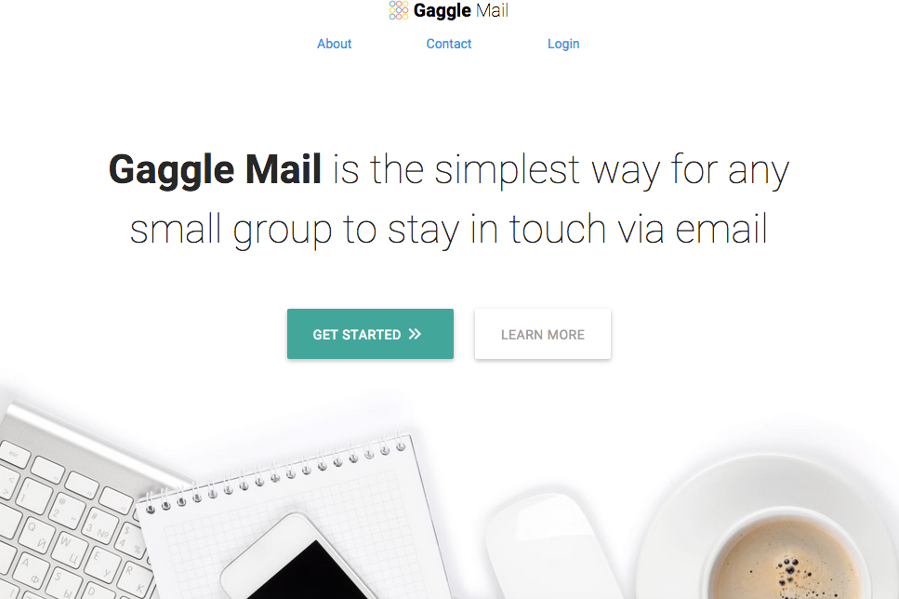What is Gaggle Mail?

Gaggle Mail is the simplest way for small groups to stay in touch via email.
Everyone is part of a small group. Maybe a book club or football team or a yoga class. Or maybe your children’s play group or dance class. Maybe you’re part of a residents association or neighbourhood watch.
If you can use email you can use Gaggle Mail – and that goes for everyone in your group.
Gaggle Mail is the absolute simplest way to setup and maintain an email group. We give you your own permanent @gaggle.email address that everyone in your group can use to contact everyone else in the group. Simple.
About Gaggle Mail
From local community groups to international associations, organizations of all sizes use Gaggle Mail to run their group email discussion. Whether you’ve got one or one hundred groups, Gaggle Mail makes setting up and running group email discussion lists easy. Enjoy free-flowing discussions with fast, reliable message delivery and empower your members with a fully searchable message archive. Stay on-brand with your own color scheme and logo then add a personal touch with a customized welcome message and footer. Group email (also known as email discussion list or listserv) generally refers to using a single email address to reach a group of people. For larger groups our paid plans are based on the number of people within the group and have a 14-day free trial with no credit card required. We have a Personal plan which starts at $0.10 per member per month, if you need more customization or want to use your own branding then we have our Professional plan which starts at $0.15 per member.

Pros
-
“ABSOLUTELY LOVE that the software eliminates duplicate emails being sent when a person is a member of more than one group that will be receiving the email. This have saved me TONS of time.”
-
“Discovering Gaggle Mail was a godsend. The integration of our old listserv data was a simple and seamless process.”
-
“Thank you very much for access to this wonderful service over the last several years.”
-
“Gaggle well worth a look – good features and excellent support.”
Cons
-
“It’s hard to find the email address of each list without digging through multiple pages of details.”
-
“A minor issue: The inability to make ‘Show Original Message’ the default. Note: Apparently, this is currently being implemented.”
What do you like best about Gaggle Mail?
I like that students can email you questions about homework
What do you dislike about Gaggle Mail?
It’s just one more thing that teachers need to learn, have a username and password for, and try and make time for
Compliance
Gaggle’s terms state they help schools and districts comply with all U.S. privacy and safety laws, particularly those involving children that include the Children’s Online Privacy Protection Act (COPPA), Children’s Internet Protection Act (CIPA), and the Family Educational Rights and Privacy Act (FERPA). Individual children are not allowed to sign up for any Gaggle product and the only way a child may obtain access to a Gaggle product is through their school. In addition, the terms state each school is responsible for creating student accounts for any Gaggle product and they may choose to provide a student’s full name, grade level, and ID number.
Gaggle’s terms specify it considers all school and district data to be confidential and does not use student data for any purpose other than to provide services. Gaggle’s terms reiterate that Student data are the property of the school or district and remain in the school or district’s control throughout the duration of any agreement or contract, and access to student information remains the legal responsibility of the applicable school.
The terms state that before a teacher or school enters, uploads, or access any data concerning a minor student, they must confirm that they have obtained appropriate consent from the parent or guardian of that student, or determined that one of the limited exceptions to the consent requirement applies. Gaggle’s terms state they will not distribute to third parties any staff or student data without the consent of either a parent/guardian or a qualified educational institution.


